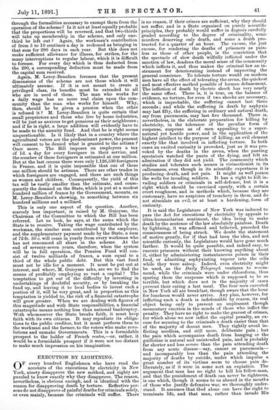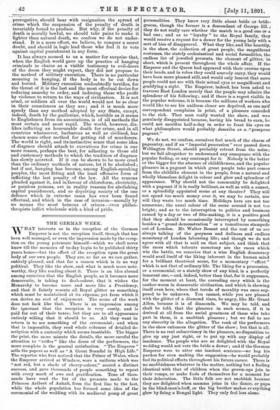EXECUTION BY LIGHTNING.
OF every hundred Englishmen who have read the accounts of the executions by electricity in New York, ninety disapprove the new method, and eighty are puzzled to know exactly why they disapprove. The reason, nevertheless, is obvious enough, and is identical with the reason for disapproving death by torture. Reflective per- sons do not disapprove of painful deaths for criminals solely, or even mainly, because the criminals will suffer. There is no reason, if their crimes are sufficient, why they should not suffer, and in a State organised on purely scientific principles, they probably would suffer in degrees carefully graded according to the degree of criminality, some murders deserving only death, and some a death pro- tracted for a quarter of an hour. The excuse, the just excuse, for rendering the deaths of prisoners as pain- less as those of other people, is the conviction that the spectacle of slow death wilfully inflicted under the sanction of law, deadens the moral sense of the community which inflicts it, and thus makes the criminal law an in- strument for deteriorating instead of improving the general conscience. To tolerate torture would on modern men have all the effect of tolerating the arena, the quickest and. most effective method possible of human debasement. The infliction of death by electric shock has very nearly the same effect. There is, it is true, on the balance of evidence, no torture, for even if two shocks are necessary, which is improbable, the suffering cannot last three seconds ; and while the suffering in death by asphyxia may last fifty, the suffering in ordinary and natural death, say from pneumonia, may last five thousand. There is, nevertheless, in the elaborate preparation for killing by electricity, in the tolerance of the peculiar form of suspense, suspense as of men appealing to a super- natural yet hostile power, and in the application of the highest intellect to the purpose of killing, an evil element exactly like that involved in inflicting torture. In both cases an excited curiosity is provoked, just as it was pro- voked by the deaths in the arena, when the panting spectators watched the pants of the dying, and felt an admiration if they did not yield. The community which studies and tolerates such scenes is vivisectionist in its callousness, even though in its scientific expertness it is producing. death, and not pain. It might as well poison the wells for invading soldiers. It has a right to kill in- vading soldiers or criminals in self-defence, but it is a. right which should be exercised openly, with a certain overt roughness, and in methods which, because they are customary, have no suspicion of trea.chery in them, and do not stimulate an evil, or at least a hardening, form of curiosity.
It is said the Legislature of New York was induced to pass the Act for executions by electricity by appeals to ultra-humanitarian sentiment, the idea being to make death by the sentence of the law absolutely painless. Death by lightning, it was affirmed and believed, preceded the consciousness of being struck. We doubt the statement of motive greatly, for if that had been the idea, and not scientific curiosity, the Legislature would have gone much farther. It would be quite possible, and indeed easy, to execute prisoners without their knowing anything about it, either by administering instantaneous poison in their food, or admitting asphyxiating vapour into the cells while they were asleep. Indeed, even electricity might be used, as the Daily Telegraph ventures to recom- mend, while the criminals were under chloroform, thus sparing them the suspense which is supposed to be so terrible, but which does not in the majority of cases prevent their eating a last meal. The four men executed in New York all ate breakfast, though aware that the hour for luncheon would never arrive. Any plan, however, for inflicting such a death is indefensible by reason, its real object being only to prevent an unpleasant though momentary emotion in the minds of those who inflict the penalty. They have no right to make the gravest of crimes, for which alone we now inflict the capital penalty, an ex- cuse for securing to the criminals a death easier than that of the majority of decent men. They rightly avoid in- flicting needless, and still more, deliberate pain ; but the pain which accompanies death from hanging or the guillotine is natural and unintended pain, and is probably far shorter and less severe than the pain attending death from any acute disease—say, cancer or pneumonia— and incomparably less than the pain attending the majority of deaths by suicide, under which impulse a great number of its victims seem to choose pain de- liberately, as if it were in some sort an expiation. The argument that man has no right to kill his fellow-man, and that the punishment of death can never be righteous, is one which, though it seems to us absurd in the mouths of those who justify defensive war, we thoroughly under- stand. It assumes that God alone can have the right to terminate life, and that man, rather than invade His prerogative, should bear with resignation the spread of crime which the suspension of the penalty of death is invariably found to produce. But why, if the penalty of death is morally lawful, we should take pains to make it lighter than natural death, we confess we do not under- stand. It is a mere effort, we believe, to conquer a secret doubt, and should in logic lead those who feel it to vote against capital punishment in any form.
It has always seemed to us a matter for surprise that, when the English world gave up the practice of hanging criminals in chains as a visible testimony to evil-doers of the doom they might expect, they did not propose to the method of military execution. There is no particular meaning in hanging, if the body is to be cut down and buried. Military execution undoubtedly terrifies, for the threat of it is the last and the most effectual device for reducing anarchy to order, and inducing those who profit by violence to return to the ways of civilisation. It is not cruel, or soldiers all over the world would not be so clear in their consciences as they are ; and it is much more speedy than any method adopted by any State, except, indeed, death by the guillotine, which, horrible as it seems to Englishmen from its associations, is of all methods the most certain and most rapid. The world, however, dis- likes inflicting an honourable death for crime, and in all countries whatsoever, barbarous as well as civilised, has chosen some other method for getting rid, of murderers. The world is right, and its instinctive sense that some idea of disgrace should attach to executions for crime is one more reason, perhaps the best, for adhering to those old and customary methods to which the tradition of disgrace has slowly accreted. If it can be shown to be more cruel than the ordinary methods of nature, let it be abolished ; but if not, banging has become, among English-speaking peoples, the most fitting and the least offensive form of inflicting the last penalty of the law. All the reasons pleaded against it, and in favour of chloroform, electricity, or painless poisons, are in• reality reasons for abolishing capital punishment, and so depriving society of the one defence which in extreme cases has ever been found effectual, and which in the case of invasion—morally by no means the most heinous of crimes—even philan- thropists inflict wholesale with a kind of pride.



































 Previous page
Previous page